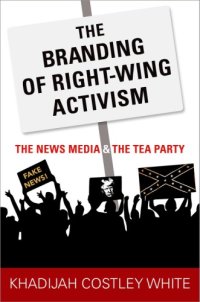
Ebook: The branding of right-wing activism: the news media and the Tea Party
Author: Costley White Khadijah
- Tags: Conservatism in the press, Conservatism in the press--United States, LANGUAGE ARTS & DISCIPLINES--Journalism, Mass media--Political aspects, Mass media--Political aspects--United States, POLITICAL SCIENCE--Political Ideologies--Conservatism & Liberalism, Politics and government, Press and politics, Press and politics--United States, SOCIAL SCIENCE--Media Studies, Tea Party movement--Press coverage, Tea Party movement -- Press coverage, Press and politics -- United States, Conservatism in the press -- United
- Year: 2018
- Publisher: Oxford University Press
- City: United States
- Language: English
- pdf
"From the start of Barack Obama's presidency in 2009, conservative populist groups began fomenting political fractiousness, dissent, and surprising electoral success. The Tea Party was one of the major characters driving this story. But, as Khadijah Costley White argues in this book, the Tea Party's ascent to major political phenomenon can be attributed to the way in which partisan and non-partisan news outlets "branded" the Party as a pot-stirrer in political conflicts over race, class, and gender. In other words, the news media played a major role in developing, cultivating, and promoting populism's brand, particularly within the news spaces of commentary and opinion. Through the language of political marketing, branding, and promotion, the news media not only reported on the Tea Party, but also acted as its political strategist and brand consultant. Moreover, the conservative press acted more as a political party than a news medium, deliberately promoting the Tea Party, and aiding in organizing, headlining, and galvanizing a conservative political base around specific Tea Party candidates, values, and events. In a media environment in which everyone has the opportunity to tune out, tune in, and speak back, The Branding of Right-Wing Activism ultimately shows that distinctions between citizens, journalists, activists, politicians, celebrities, and consumers are more symbolic than concrete."--;Headphone Culture: A Preface -- Welcome to the Party -- The Tea Party as Brand -- Rebranding Political Conservatism Through Race, Gender, and Class -- Reading the Tea Leaves-The News about the News -- Conclusion: Boundaries Blurred -- Appendix: Sources and Methodology.;"The project looks at the ways in which partisan and non-partisan online, broadcast, and print news outlets constructed the Tea Party through branding discourse and used it to address modern conflicts over race, class, gender, journalism, and politics. It does so by focusing on the key episodes during which the reporting of the Tea Party surged in cable news, comparing the coverage across networks and outlets. This manuscript shows that news outlets and reporters were not just producing pieces that targeted their individual audience but, rather, also aiming their reports at one another. They were not just an echo chamber-they were a feedback loop. But beyond the creation of the Tea Party, this project investigates what the mass-mediated construction of the Tea Party tells us about the current media and cultural moment, specifically the role of journalism in a Web 2.0 age and contemporary American notions of democracy, citizenship, and belonging. In particular, it shows that the news media played a major role in developing, cultivating, and promoting populism's brand, particularly within the news spaces of commentary and opinion oft-neglected by media scholars. Through the language of political marketing, branding, and promotion, the news media not only reported on the Tea Party, but also acted as its political strategists and brand consultants. Moreover, the conservative press acted more as a political party than a news medium, deliberately promoting the Tea Party, provoking news coverage, organizing, headlining, and galvanizing a conservative political base around specific Tea Party candidates, values, and events"--
Download the book The branding of right-wing activism: the news media and the Tea Party for free or read online
Continue reading on any device:

Last viewed books
Related books
{related-news}
Comments (0)